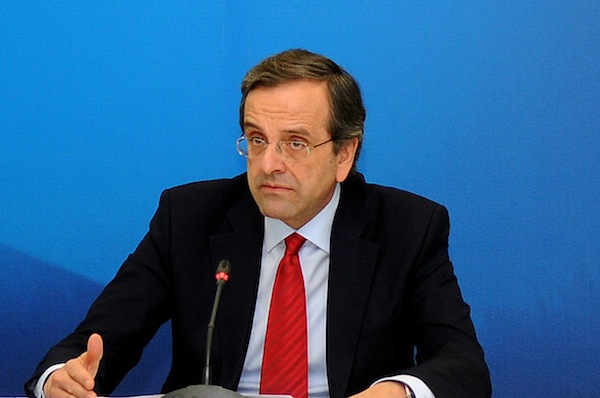By ALKMAN GRANITSAS, COSTAS PARIS, NEKTARIA STAMOULI and MATINA STEVIS, Wall Street Journal
ATHENS—Greece’s Socialist party leader Evangelos Venizelos said Wednesday that his Pasok party, the conservative New Democracy and the Democratic Left are in the process of putting together a government agenda, as they had reached agreement to form a coalition government.
“The parliamentary conditions [majority] have been met for the formation of a government,” Mr. Venizelos said after meeting New Democracy leader, Antonis Samaras.
Mr. Samaras is set to be sworn in as prime minister Wednesday, state television Net reported.
Mr. Samaras will meet Greek President Carolos Papoulias to inform him that he has secured enough seats in parliament to form a workable government.
Mr. Venizelos said that outgoing Finance Minister George Zanias will represent Greece in Thursday’s meeting of European finance ministers in Luxembourg.
The talks on forming a coalition, now in their third day, followed closely fought June 17 elections in Greece—the second vote in as many months—that were widely seen as a de facto referendum on the country’s bailout and, by extension, Greece’s future inside the euro zone. Although New Democracy won the most votes in the elections, it didn’t control enough seats to govern on its own and sought a coalition partner to form a majority in Greece’s 300-member parliament.
Messrs. Samaras and Venizelos—who shared power in Greece’s previous coalition government—had been wooing Fotis Kouvelis’s Democratic Left party in an effort to form a broad-based coalition. Combined, the three parties would command 179 seats in Greece’s 300-member Parliament, giving them a comfortable majority to face off strident opposition from Greece’s Syriza party—which came in a strong second in Sunday’s vote after campaigning on a fierce antiausterity platform.
But the issue of who will serve in the new government has been one potential stumbling block in the talks so far. Each of the three parties is facing questions over whom they would name to Greece’s roughly 15 cabinet ministries.
Socialist Pasok’s senior leadership has been divided over whether the party should name some of its own lawmakers to the cabinet, or opt instead for outside technocrats. Democratic Left has already said it won’t put its own people in government, but will name technocrats and will back the coalition with a vote of confidence.
Mr. Samaras wants to staff the cabinet with party officials, but has so far found few willing volunteers for the all-important role of finance minister. The conservatives have floated two names—former European Commissioner Stavros Dimas and former Development Minister Kostis Hatzidakis—but both men appear to be reluctant to take the job. A compromise candidate, National Bank of Greece SA NBG +14.14% Chairman Vasilis Rapanos—a respected academic—is now seen as the front-runner.
“Samaras wanted Dimas, but early on, even before the election, Dimas had reservations. Other New Democracy heavyweights want to avoid the ministry like the devil, so a nonpolitical figure became the accepted compromise,” a New Democracy official said.
The new finance minister will be faced with the unenviable task of bringing Greece’s derailed fiscal targets back on track after weeks of political paralysis and come up with €11.6 billion or more of new austerity measures demanded by the country’s creditors, which could further inflame the public.
The new government faces many hurdles, with a central administration threatened by a cash crunch within weeks, an economy in free fall and an angry public exhausted by two years of austerity measures.
New Democracy and Pasok have been working on a plan to ask other euro-zone countries for an extra two years to meet Greece’s fiscal targets—something that all three parties support. Likewise there has been broad agreement that there should be no further cuts in pensions and salaries, and that the new government should try and ease some of the financial burden on over-indebted households.
But even as the party representatives work on a common plan, the first test of the new government’s policy changes may come as soon as Thursday and Friday, when European finance ministers are scheduled to meet in Luxembourg. Greece’s desire for a two-year extension on its deficit targets could cost its European partners an additional €16 billion to cover the country’s financing needs.
That is something that has drawn mixed signals from elsewhere in the euro zone, with some officials saying they would be open to such an extension, but opposition coming from Germany, Europe’s effective paymaster.









